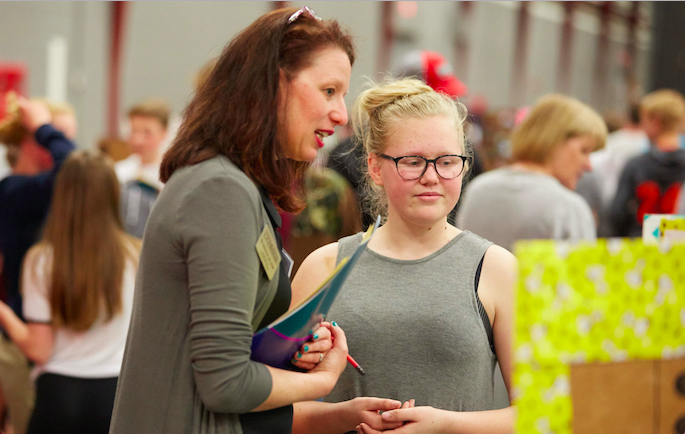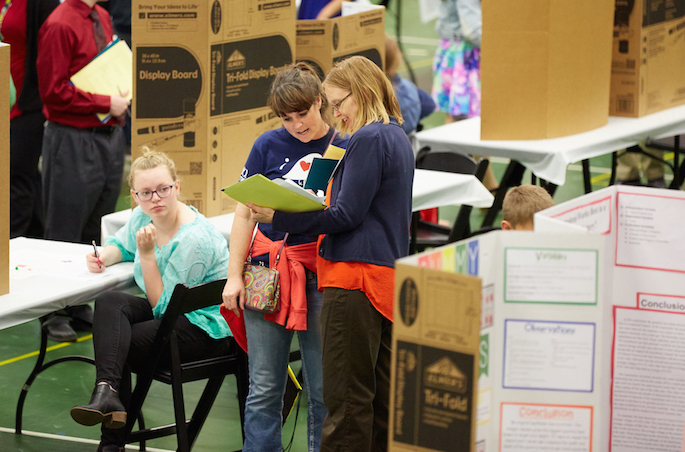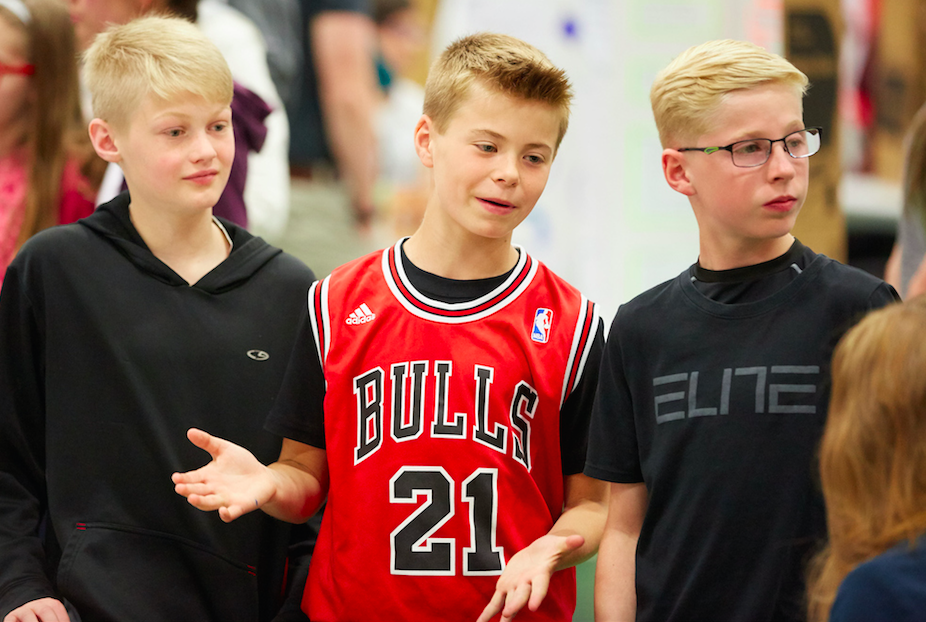Posted 4:30 p.m. Thursday, May 11, 2017

Science & Math Expo at UWL gets area kids engaged in creation, discovery and more.
Science & Math Expo at UWL gets area kids engaged in creation, discovery and more
Ask three 8th graders about their latest science project, and their eyes open wide. Kora, Lydia and Amalia Malecek, triplets from Onalaska Middle School, have been working on a science experiment after school for more than a month. Their excitement was palpable at UW-La Crosse Tuesday, May 9, as they shared their research process and results for the first time. Asked what exactly they did, and they all lean in and begin talking at once. “I hate when we do that!” says Kora. The three surveyed adults to find out whether, in fact, their science teachers are correct when they say, “You’ll use this later.” They gave adults in non-science related careers a quiz of 8th-grade science questions to see how they would do. They then assessed whether adults do, in fact, use their 8th-grade science education. The Maleceks were one one of many groups of area kids in grades 6-8 presenting scientific experiments and math games they designed during the Science & Math Expo in Mitchell Hall Fieldhouse. The event aimed to demonstrate the importance of mathematics and the sciences to middle school children. It was organized by Gundersen Medical Foundation, UW-La Crosse Continuing Education and Extension, and UW-La Crosse College of Science and Health. “It’s important for kids to see that everyone can do math and science, and there are so many directions to take it,” says Susan Kelly, UWL professor of mathematics and statistics who helped organize the event. “We run this at a young age to get kids engaged in these subjects … They see anyone can make a discovery and share it.” [caption id="attachment_48836" align="alignnone" width="685"] Adrienne Loh, professor of Chemistry and Biochemistry and chair of the Educational Studies Department, was one of many UWL faculty volunteers who helped review posters.[/caption]
Volunteers reviewers from UWL and other organizations walked around taking notes and talking to kids. Adrienne Loh, professor of chemistry and biochemistry and chair of the Educational Studies Department, was one of those reviewers. Engaging kids in science is particularly important when kids are exposed to negative feedback in the media about science, she says. Scientists are frequently the evil villains on TV and in movies, and science is sometimes associated with anti-fun or anti-progress, she says.
“We hear a lot in the news now about people not believing in global warming. Science is not a belief system,” says Loh. “For kids to participate in this and see that data leads to conclusions — that it is not a belief system — is really powerful.”
On a more personal level, Loh says her own daughter will be entering middle school next year and she is excited to think about her participating in the expo. In middle school kids are developing their own voice, interests, and sense of how they can contribute to society, she says.
“Science is a great vehicle for that,” adds Loh. “As a young person, you can contribute to the scientific pool of knowledge … It’s been exciting to see young minds investigate things they think are interesting.”
The Malecek sisters found the average adult scored about 54 percent on their science quiz, lower than the girls hypothesis of at least 75 percent. They concluded that their subjects didn’t retain the eighth-grade science information well, but that had a lot to do with the professional paths they’d chosen, which didn’t demand they use it regularly.
Unlike their research subjects, the Maleceks are planning to use a lot of science in their futures. Kora and Lydia want to be veterinarians and Amalia wants to be a pediatrician. They are all strongly considering UWL as a starting point in that professional path.
“It’s a friendly place,” says Lydia. “And that student union is pretty cool,” adds Kora.
Adrienne Loh, professor of Chemistry and Biochemistry and chair of the Educational Studies Department, was one of many UWL faculty volunteers who helped review posters.[/caption]
Volunteers reviewers from UWL and other organizations walked around taking notes and talking to kids. Adrienne Loh, professor of chemistry and biochemistry and chair of the Educational Studies Department, was one of those reviewers. Engaging kids in science is particularly important when kids are exposed to negative feedback in the media about science, she says. Scientists are frequently the evil villains on TV and in movies, and science is sometimes associated with anti-fun or anti-progress, she says.
“We hear a lot in the news now about people not believing in global warming. Science is not a belief system,” says Loh. “For kids to participate in this and see that data leads to conclusions — that it is not a belief system — is really powerful.”
On a more personal level, Loh says her own daughter will be entering middle school next year and she is excited to think about her participating in the expo. In middle school kids are developing their own voice, interests, and sense of how they can contribute to society, she says.
“Science is a great vehicle for that,” adds Loh. “As a young person, you can contribute to the scientific pool of knowledge … It’s been exciting to see young minds investigate things they think are interesting.”
The Malecek sisters found the average adult scored about 54 percent on their science quiz, lower than the girls hypothesis of at least 75 percent. They concluded that their subjects didn’t retain the eighth-grade science information well, but that had a lot to do with the professional paths they’d chosen, which didn’t demand they use it regularly.
Unlike their research subjects, the Maleceks are planning to use a lot of science in their futures. Kora and Lydia want to be veterinarians and Amalia wants to be a pediatrician. They are all strongly considering UWL as a starting point in that professional path.
“It’s a friendly place,” says Lydia. “And that student union is pretty cool,” adds Kora.
Math game building begins
[caption id="attachment_48839" align="alignnone" width="685"] Jenni McCool, left, and Jennifer Kosiak were among the UWL Mathematics and Statistics faculty members who helped review posters for the math game component of the expo this year. Five groups of kids brought math-related games they developed.[/caption]
This is the first year that a math game component was added to the expo with support from faculty in UWL’s Mathematics and Statistics Department. Five groups of kids brought math-related games they developed.
“They can let their creative juices flow and build a game … thinking about rules, fairness, probability, what if scenarios and more. There is a lot to it,” says Jenni McCool, associate professor of Mathematics & Statistics.
Jackson Conroy, Elias McCool and Noah Djerke-Wieser, of La Crescent-Hokah Middle School, invented a spin-off of Monopoly about Minnesota history called “Minn-opoly.” Not only does the game incorporate their social studies curriculum, it also includes plenty of math from buying and selling properties to the probability of rolling a number that will yield a good or bad chance card.
[caption id="attachment_48841" align="alignnone" width="926"]
Jenni McCool, left, and Jennifer Kosiak were among the UWL Mathematics and Statistics faculty members who helped review posters for the math game component of the expo this year. Five groups of kids brought math-related games they developed.[/caption]
This is the first year that a math game component was added to the expo with support from faculty in UWL’s Mathematics and Statistics Department. Five groups of kids brought math-related games they developed.
“They can let their creative juices flow and build a game … thinking about rules, fairness, probability, what if scenarios and more. There is a lot to it,” says Jenni McCool, associate professor of Mathematics & Statistics.
Jackson Conroy, Elias McCool and Noah Djerke-Wieser, of La Crescent-Hokah Middle School, invented a spin-off of Monopoly about Minnesota history called “Minn-opoly.” Not only does the game incorporate their social studies curriculum, it also includes plenty of math from buying and selling properties to the probability of rolling a number that will yield a good or bad chance card.
[caption id="attachment_48841" align="alignnone" width="926"] From left, Noah Djerke-Wieser, Elias McCool and Jackson Conroy, of La Crescent-Hokah Middle School, shared a math-related game about Minnesota they created called “Minn-opoly.”[/caption]
Elias says they already learned the math concepts of the game in classes, but incorporating it into something they built from scratch using scissors, paper and paste was fun.
Presenting it on a college campus and sharing it with local media who interviewed them, was a bit nerve-racking, add Conroy and Djerke-Wieser. But overall they all found it exciting.
Elias and Djerke-Wieser say they can see using math in future careers — potentially as an aerospace engineer and carpenter, respectively.
“We need kids interested in math,” says Jenni. “Math is the language of science.”
From left, Noah Djerke-Wieser, Elias McCool and Jackson Conroy, of La Crescent-Hokah Middle School, shared a math-related game about Minnesota they created called “Minn-opoly.”[/caption]
Elias says they already learned the math concepts of the game in classes, but incorporating it into something they built from scratch using scissors, paper and paste was fun.
Presenting it on a college campus and sharing it with local media who interviewed them, was a bit nerve-racking, add Conroy and Djerke-Wieser. But overall they all found it exciting.
Elias and Djerke-Wieser say they can see using math in future careers — potentially as an aerospace engineer and carpenter, respectively.
“We need kids interested in math,” says Jenni. “Math is the language of science.”
